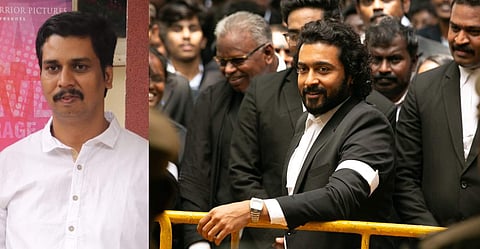

Hours after Jai Bhim’s digital premiere at midnight, social media feeds were replete with appreciation for Tha Se Gnanavel’s film, starring Suriya in the lead. “Hard-hitting”, “intense”, and “brutal” were some recurring comments. The courtroom drama is an unflinching union of multiple topics: custodial violence, marginalisation, and the need for equality. The no holds barred portrayal of police brutality makes Jai Bhim one of the most violent and discomfiting Indian films to come out in a long time. Innocents are hanged by their thumbs; green chilli is smeared over fresh wounds… you get the idea of the savagery at play.
The real incidents that inspired the film, Gnanavel says, were even harsher. “We calculated, carefully, the amount of violence the average viewer could digest. Some prefer watching intense films, others shut their eyes even to mild violence. We aimed to hit the middle ground. In order to achieve this, we could show only about a quarter of what the real incidents were,” Gnanavel says. “And even that was enough to get us an ‘Adults Only’ rating from the CBFC. The violence was essential to illustrate the pain of the real victims.”
Around the portrayal of injustice and tyranny inflicted upon marginalised castes, exists the story of Justice K Chandru, whose real-life efforts to seek justice for the oppressed inspired the film. Gnanavel adds that the former High Court Judge was a crucial part of his research on the real incidents that transpired in the ‘90s. “His one-and-a-half-year-long legal battle inspired me to make Jai Bhim. The complex legal proceedings happened over 30 years ago, and yet, Justice Chandru remembers every minute detail of the case, as he was closely attached to it. It also helped that he holds all the court documents. The real incidents involved victims of a different tribe, but I changed it to the Irula community in the film because they are more affected by unjust treatment,” shares Gnanavel, adding that his acquaintance with Justice Chandru goes back to the former’s days as a journalist.
In Jai Bhim, Chandru, played by Suriya, is the personification of equality and the desire to secure justice for those denied. It is a character sans the ‘masala heroism’ that one associates with the star. Gnanavel, however, asserts that ‘commercial films’ and ‘heroism’ need not be restricted to the templates Tamil cinema has adhered to for decades. “While telling a true story, it’s obligatory that I stay honest to the truth, and hence, Jai Bhim doesn’t fall under the standard mass category; it's devoid of extra flourishes such as songs and fights. I believe the so-called commercial cinema is all about how well the film connects with the audience; It can be done through a variety of genres. It’s a myth that a film with songs and fights tends to perform well,” he says. “When a filmmaker narrates a script to a star, the former feels compelled to capitalise on the star’s image. Rarely do filmmakers and writers ask a star to try something new. I, however, wrote the script without a hero in my mind and I have always believed that the script has a lot of scope for heroism... real heroism. I don’t believe there can be a greater heroic act than standing for victims. That’s how leaders are born.”
Speaking of what he wishes the viewers to take away from the legal drama, Gnanavel shares, “We choose to remain mute spectators in spite of knowing what transpires around us in everyday life. I’m sure the film will incite a question about our silence. One may wonder whether anyone can give a fitting answer to oppression, but the fact that Chandru has done it in real life will give them hope. As a creator, I’m glad to have documented a part of his life so it can be celebrated by all.”
But does Gnanavel believe cinema can change the world? “Athula santeham eh illa,” he affirms. “From dressing style to habits like smoking, we have seen films influence people for decades. It is a powerful medium, but, sadly, we still haven’t tapped into its full potential. Restricting cinema to entertainment is similar to using an elephant, a mighty being capable of uprooting a heavy tree, for street shows. I mean this as self-criticism as well. The objective of art is not just to entertain but enlighten as well,” Gnanavel concludes. Jai Bhim is certainly an efficient beginning to that end.